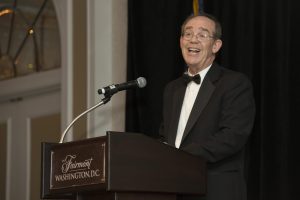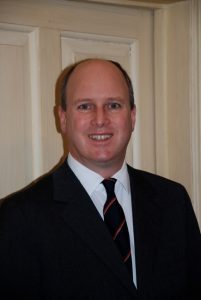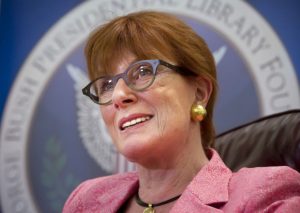
Bulletin #65 - Nov 2013
2013 Churchill Conference Is Biggest Ever
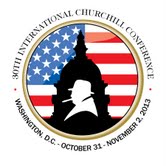
November 11, 2013
Record Attendance for 30th International Conference in Washington, D.C. Full Details
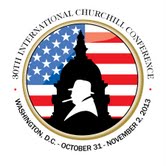 From a historic ceremony in the Capitol building to a Gala Black Tie dinner in the venerable Fairmont Hotel, the 30th International Conference included a record number of prominent Churchill enthusiasts, scholars and distinguished guests. A prelude to the formal conference schedule was the dedication ceremony of a bust of Winston Churchill donated to the United States Congress by The Churchill Centre [See lead story in this Bulletin.] On Thursday, 31 October, the conference itself began with three organized tours. This was followed by two days of panels at The George Washington University and two major banquets. Well over 300 people attended these events.
From a historic ceremony in the Capitol building to a Gala Black Tie dinner in the venerable Fairmont Hotel, the 30th International Conference included a record number of prominent Churchill enthusiasts, scholars and distinguished guests. A prelude to the formal conference schedule was the dedication ceremony of a bust of Winston Churchill donated to the United States Congress by The Churchill Centre [See lead story in this Bulletin.] On Thursday, 31 October, the conference itself began with three organized tours. This was followed by two days of panels at The George Washington University and two major banquets. Well over 300 people attended these events.
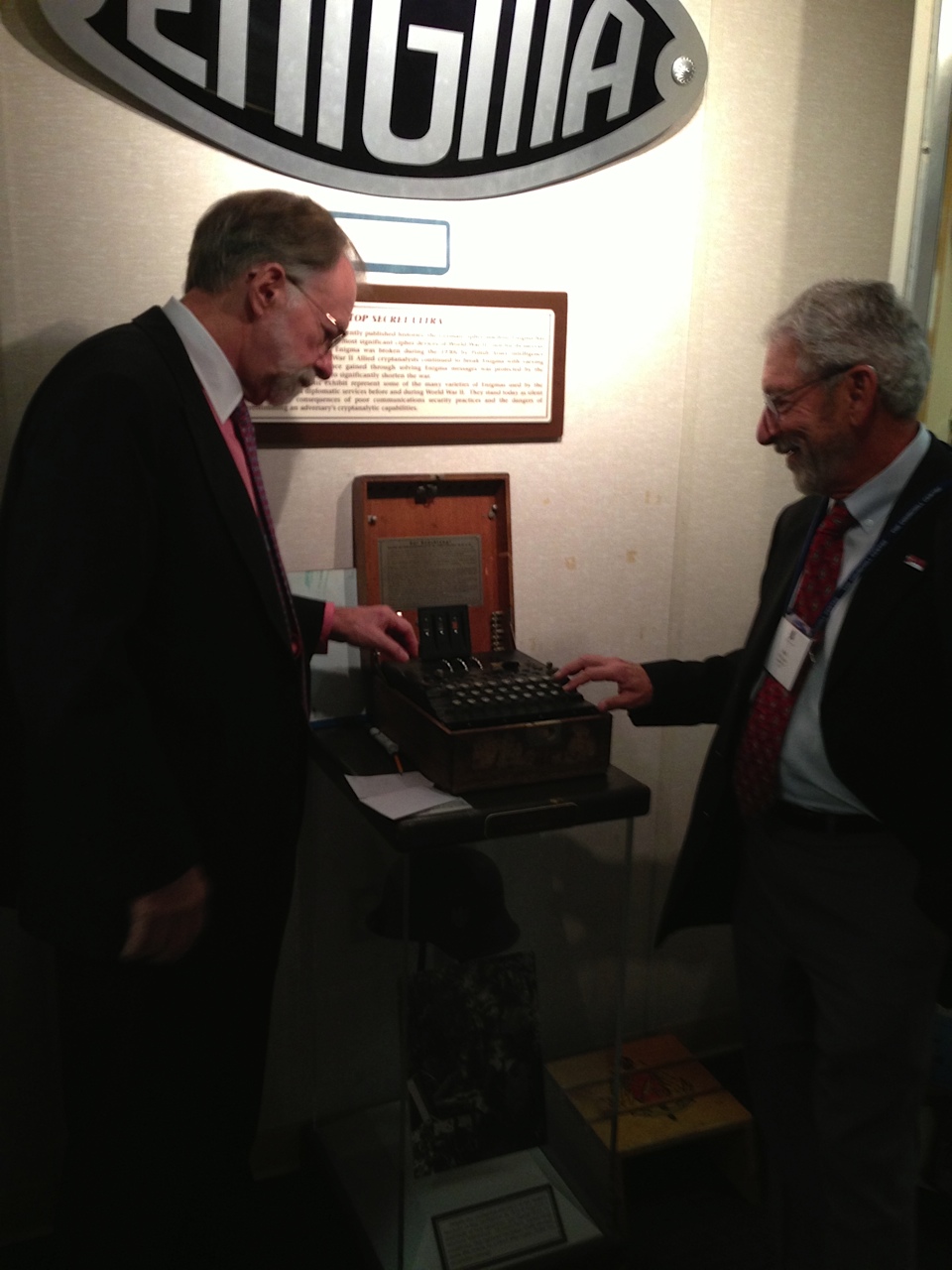 Ken Rendell and Phil Lyons Examining EngimaOn the first day of the conference, attendees boarded busses to visit the National Cryptologic Museum, Dodona Manor (home of Gen. George C. Marshall) and to view “Washington By Night.” The Cryptologic Museum included a display about the Enigma machine. Used by the Germans during the Second World War, the machine was thought by them to generate codes that were unbreakable but which were in fact being read by British intelligence at Bletchley Park. This was the “Ultra Secret” of the war and a key to Allied victory, which Churchill called his “golden eggs.”
Ken Rendell and Phil Lyons Examining EngimaOn the first day of the conference, attendees boarded busses to visit the National Cryptologic Museum, Dodona Manor (home of Gen. George C. Marshall) and to view “Washington By Night.” The Cryptologic Museum included a display about the Enigma machine. Used by the Germans during the Second World War, the machine was thought by them to generate codes that were unbreakable but which were in fact being read by British intelligence at Bletchley Park. This was the “Ultra Secret” of the war and a key to Allied victory, which Churchill called his “golden eggs.”
On Friday, 1 November the formal portion of the conference began at the Marvin Center on the campus of The George Washington University. After a presentation from Churchill Centre Chairman Laurence Geller about the National Churchill Library [see story in this issue], Sir David Cannadine delivered the first talk. Sir David spoke about the “Shadow of Munich” and placed the event in historical context by noting that it was preceded by a “Shadow of Passchendael” and how the Munic agreement “shadowed” subsequent moments in history.

2024 International Churchill Conference
Prof. Richard Toye of the University of Exeter and Allen Packwood, Director of the Churchill Archive Centre at Cambridge University, both spoke about researching Churchill in the digital age with emphasis on access to material via the internet. After a lunch-time talk about “Churchill & Eleanor Roosevelt” by the editor of the First Lady’s papers, Mary Jo Blinker, a panel headed by Finest Hour editor Richard M. Langworth surveyed Churchill’s relationship with every US president from McKinley to Eisenhower.
Saturday morning began with a panel chaired by RAdm. Michael T. Franken, the first commanding officer of the USS Winston S. Churchill, addressing the topic of “Churchill & Military Leadership.” Prof. Raymond Callahan surveyed Churchill’s relationship with the different armies of the Commonwealth that fought in the Second World War. Prof. Mark A. Stoler spoke of General of the Army George C. Marshall, whom he noted Churchill described as “noblest Roman of them all.” Professors Christopher Bell and Williamson Murray spoke about Churchill’s leadership of the Royal Navy and RAF respectively.
During lunch on Saturday, Prof. Christopher Harmon of the Marine Corps University interviewed Paule Reid about the writing of the third and final volume of The Last Lion trilogy started by the late William Manchester. In the afternoon Andrew Roberts spoke about Churchill’s ambiguous religious identity while Dr. John Mather spoke about Churchill’s health history. Barry Singer of Chartwell Booksellers in New York City wrapped up the panel presentations with a refreshing look at Churchill’s style of living.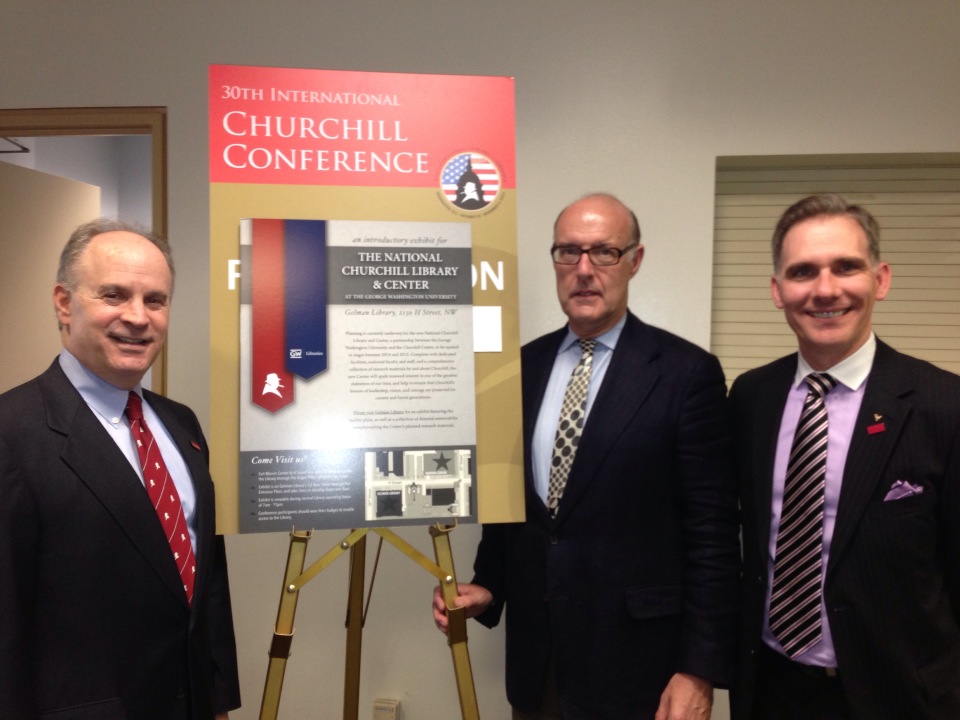 Sir David Cannadine (center) is joined by Churchill Center Executive Director Lee Pollock (left) and Chartwell Bulletin Editor David Freeman (right) at the 30th International Churchill Conference in Washington, D.C.
Sir David Cannadine (center) is joined by Churchill Center Executive Director Lee Pollock (left) and Chartwell Bulletin Editor David Freeman (right) at the 30th International Churchill Conference in Washington, D.C.
Subscribe
WANT MORE?
Get the Churchill Bulletin delivered to your inbox once a month.
